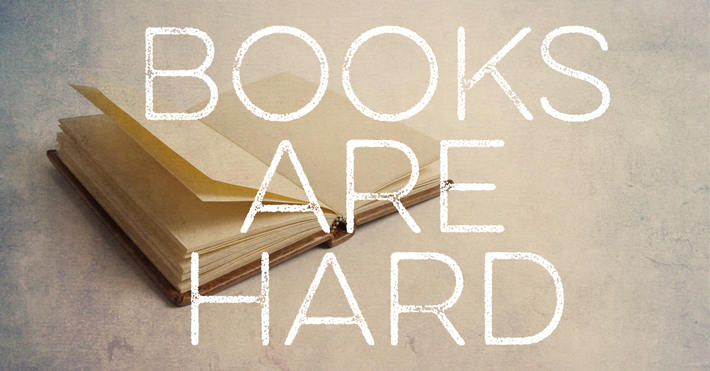The Hardest Books You’ve Never Read
The other day on Buzzfeed, Louis Peitzman put together a list of the 25 Most Challenging Books You Will Ever Read. I was disappointed to see that I had read ZERO of the books on the list. As someone who prides herself on (attempting to be) well read this was a punch in the gut. It got me thinking about difficult books. Hard books. Challenging books. What’s the deal with those guys?

Readers find books difficult for different reasons. Here are a few:
- Too boring
- Too confusing
- Too weird
- Too sad
- Too disgusting
- Too frightening
- You couldn’t care less
There are other things that can make a book feel difficult, too:
- Your high school English teacher ruined it for you
- All the other ladies in your book club read faster than you and then make you feel bad for not being done on time
- The typeface is all wrong and the design of it offends you
- The book is too big and heavy for you to comfortably read in bed (when you fall asleep reading it whacks you in the face)
- The main character is pretty much the worst human being ever, even in fictional form
- It’s a library book*
*Just how many people have borrowed this already and what have they done with it? Has even one of those people taken it with them to the bathroom?
Two of the most difficult reading experiences I ever had happened in college. First, I had to read Beowulf in the original Old English. If right now you’re thinking–like I initially did–that Old English is no biggie, just a bunch of ye’s and thee’s and whatnot, YOU’RE WRONG. Reading in Old English is the act of translating a different language. Preparing for class was a nightmare in which I cried at my desk while my boyfriend watched Bad Boys on TNT. For an example of what I was dealing with see the video below.
The second challenging reading experience was in grad school with Ezra Pound. Pound–that difficult motherf@#er–was deliberately opaque, perhaps even calculatingly tough. One of the fathers of modernism, Pound’s battle cry was “Make it new!” For Pound, it was almost as if that involved a “forget you” to the audience, or at least, those readers who weren’t dedicated enough to stick with a literary work until they found something in it. I don’t like to put myself in this category, but sometimes if the shoe fits…
Pound was largely responsible for bringing the writers James Joyce and T.S. Eliot into the literary limelight, championing their works even though they did not initially draw a big audience. Joyce, as it happens, makes the Buzzfeed list at both #16 AND top spot #1.
Thomas Pynchon‘s Gravity’s Rainbow is #5 on the list. One of my professors in college wrote an entire book to explain Gravity’s Rainbow, page by page. He told the class that Patti Smith even sent a personal letter to thank him.

Of the 25 books on the list, 19 are written by old white dudes (I exempted David Foster Wallace because his life ended before he got to be old) so perhaps being difficult is an old white dude thing. But that’s not right either, because to me Gertrude Stein puts all those guys to shame. Ever tried to tackle Tender Buttons? “Asparagus in a lean in a lean is to hot. This makes it art and it is wet weather wet weather wet.”
So I don’t know where I come out on this. Last week Slate got everyone all hot and bothered with the headline, “Yes, Adults Should Be Embarrassed to Read Young Adult Books.” To be honest, part of me kind of agrees. One of the more difficult books I’ve read lately was The Fault in Our Stars, not because it was hard to read–I got through it in two days–but because I kept having to pause and roll my eyes. I could easily get carried away with the sappy heartache of the teen love story–I’m sickeningly addicted to super soapy plots–but it was continually frustrating that the author wasn’t making more of an attempt to go deeper into what it means to love and to die.
Maybe he didn’t because he didn’t have to, because he was writing for young adults, for teenagers just beginning to figure out what those gigantic ideas are all about. Not that teens aren’t capable of understanding more complex ideas about love and death….well yeah, actually, I don’t think teens are capable of understanding complex ideas about love and death. Look, I remember how my brain functioned at 15. When you’re older, you’re wizened, you’re wounded. You need more. Or, at least, you demand more. It takes some work to figure out how to live your life, how to love, how to deal with death and loss, and we look to art (in the form of books, music, and more) to help us with these things.
Maybe it’s easy to avoid a difficult book or a shocking art installation or even put meaning to complex song lyrics because life is hard, and understanding it is hard too. But it’s important to eat your veggies and get what’s good for you, because what’s good for you is to THINK. “This makes it art and it is wet weather wet weather wet”!!
Tackle those difficult books! And let us know, which ones have you read? Tweet us @iReadandSing or comment below.




Connect With Bushwick